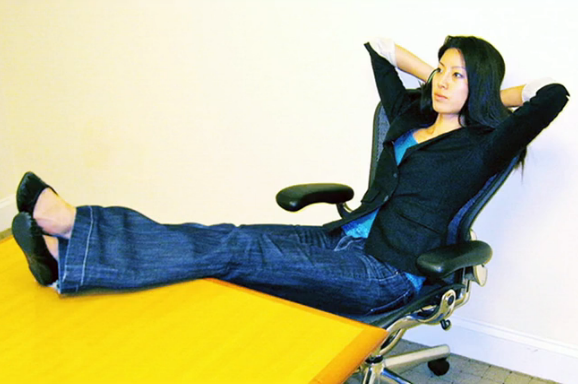So we know that in primate hierarchies, if an alpha needs to take over,
靈長動物的社群階級里,如果一個強勢雄性想要奪權,
if an individual needs to take over an alpha role sort of suddenly,
如果一個雄性突然想要爭取首領這個角色,
within a few days, that individual's testosterone has gone up significantly and his cortisol has dropped significantly.
幾天內,他體內的睪酮一定急速增加,而其腎上腺皮質醇劇烈地減少。
So we have this evidence, both that the body can shape the mind,
身體影響心理,由此可證,
at least at the facial level, and also that role changes can shape the mind.
至少就表面而言是如此,同時角色的轉換也會影響心理。
So what happens, okay, you take a role change,
所以,如果你改變角色,
what happens if you do that at a really minimal level, like this tiny manipulation, this tiny intervention?
如果你做一個微小改變會怎樣,像這樣的操作,這樣一個小小的干預?

"For two minutes," you say, "I want you to stand like this, and it's going to make you feel more powerful."
“持續二分鐘”,你說,“我要你們這樣站著,它會讓你感到更充滿力量。”
So this is what we did. We decided to bring people into the lab and run a little experiment,
接著我們就決定做這個實驗。我們將人們帶進實驗室做個小實驗,
and these people adopted, for two minutes, either high-power poses or low-power poses,
這些人將擺出有權勢的姿態或無力的姿態兩分鐘,
and I'm just going to show you five of the poses, although they took on only two.
現在我們一起看這五種姿勢,雖然他們只做了其中二種。
So here's one. A couple more. This one has been dubbed the "Wonder Woman" by the media.
這是其一。再兩個姿勢。這個姿勢是媒體一般稱為“神力女超人”的姿態。
Here are a couple more. So you can be standing or you can be sitting.
還有這兩個。或站或坐。
And here are the low-power poses. So you're folding up, you're making yourself small.
這些是無助的姿勢。你雙手交叉,試著讓自己變小一點。
This one is very low-power. When you're touching your neck, you're really protecting yourself.
這張顯現非常無助的樣子。當你摸脖子,你其實在保護自己。











